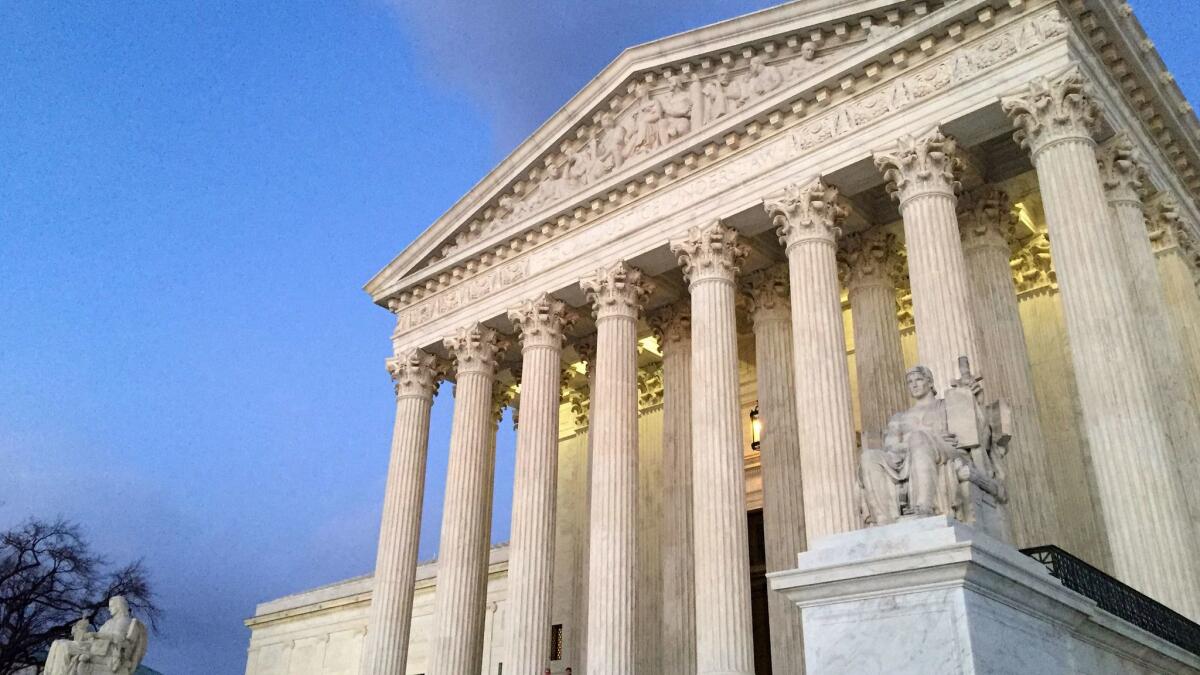Supreme Court puts off hearing a case on job protections for LGBT employees

Reporting from Washington — The Supreme Court has put off for a year or more a ruling on whether gays and lesbians are protected from job discrimination under the federal civil rights law.
The justices without comment or dissent declined to hear a Georgia woman’s suit that alleged she was pushed out of her job as a hospital security guard because she is a lesbian.
The Civil Rights Act of 1964 says employers may not discriminate on the basis of race, sex, religion and nationality. And lower courts have split recently over whether the ban on sex discrimination includes discrimination based on sexual orientation.
Lawyers for Lambda Legal hoped the high court would hear the case of Jameka K. Evans vs. Georgia Regional Hospital to resolve the dispute and issue a ruling with nationwide impact. But the case had some procedural flaws. Evans filed her original complaint without a lawyer and did not serve papers on the hospital. As a result, the hospital said it would not participate in the case.
Gregory Nevins, director of Lambda’s Employment Fairness Project, said Monday’s court action was disappointing. “The Supreme Court is delaying the inevitable and leaving a split in the circuits that will cause confusion across the country,” he said. “But this was not a ‘no’ but a ‘not yet.’ ” He was referring to the court’s rule that declining to hear an appeal is not a decision.
But turning away the Evans case almost certainly means the high court will not rule on the issue until 2019.
In April, the U.S. 7th Circuit Court of Appeals in Chicago ruled Kimberly Hively could sue her employer under the federal civil rights law for allegedly discriminating against her because she is a lesbian. Her employer, Ivy Tech Community College in Indiana, denied discriminating against Hively but announced it “does not intend to seek Supreme Court review.”
In September, the U.S. 2nd Circuit Court in New York heard the case of a skydiving instructor who was fired after telling customers he was gay. Don Zarda was killed in a 2014 diving accident, but his sister and his life partner have carried on the suit in Zarda vs. Altitude Express.
The argument in that case featured not just a split on the law, but a split between two federal agencies. The U.S. Equal Employment Opportunity Commission, which enforces the job bias laws, argued for extending the 1964 law to forbid sexual orientation. Meanwhile, the Justice Department led by the Trump administration said the law did not apply to bias claims based on sexual orientation.
Even if the New York court rules this month, the losing side is not likely to appeal until early next year, too late for the Supreme Court to take up the case this term. The justices could agree to hear an appeal in the fall of 2018 and issue a ruling in the first half of 2019.
Major questions before the Supreme Court this fall »
On Twitter: DavidGSavage
More to Read
Get the L.A. Times Politics newsletter
Deeply reported insights into legislation, politics and policy from Sacramento, Washington and beyond. In your inbox three times per week.
You may occasionally receive promotional content from the Los Angeles Times.











